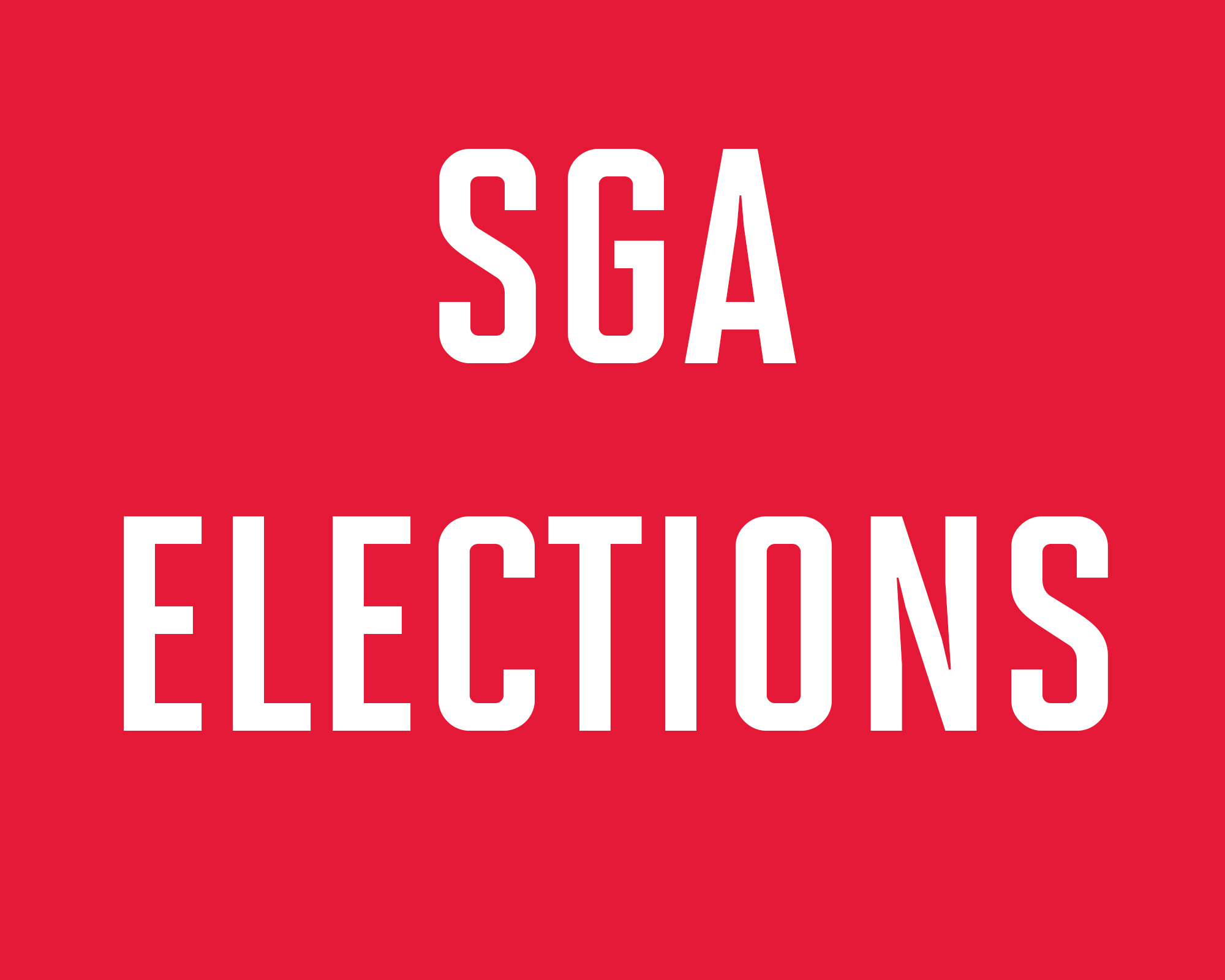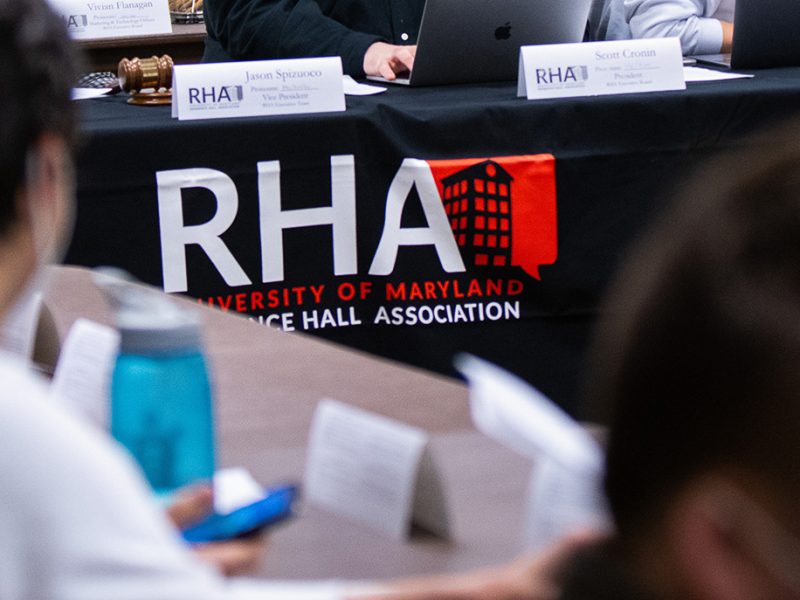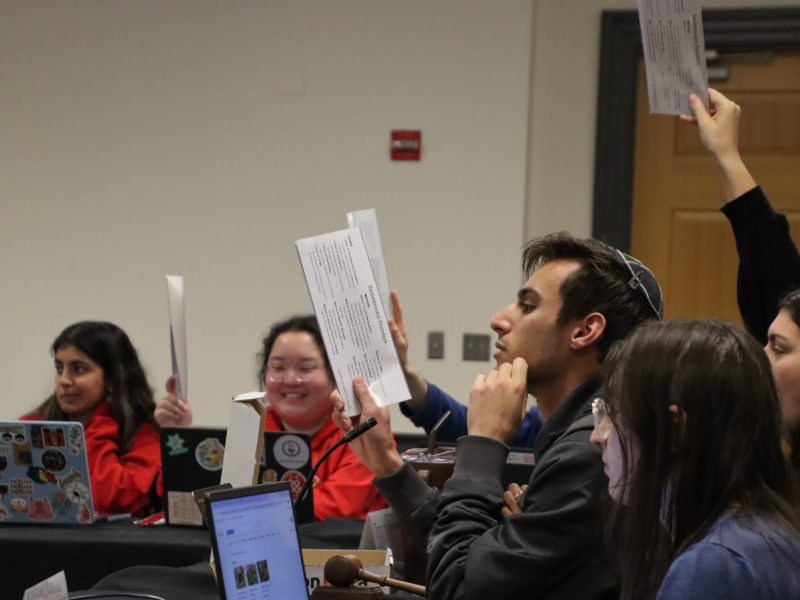A day after former Terps for Trump members chalked pro-deportation and Trump messages outside Stamp Student Union, Ajay Mahesh asked the two SGA presidential candidates how they would address language that marginalizes certain campus communities.
The junior public health major’s question elicited responses from both Chris Boretti and A.J. Pruitt, who went head to head in the second and final presidential debate of the spring 2017 election season on Tuesday night in McKeldin Library. About 20 people were in attendance.
Pruitt, the current Student Government Association vice president of student affairs who is running on the One Party ticket, said student responses — which included counter-chalking and washing messages away — were an appropriate way to respond to the situation. But he added the SGA can make more of an effort to show all students that they are welcome on the campus.
The SGA previously passed a resolution in February urging the University of Maryland’s administration to declare this university a sanctuary campus after President Trump — who has promised a crackdown on undocumented immigrants — became president.
[Read more: SGA candidates take part in election debate hours after Unity Party withdraws]
“This year some of the steps we have taken … is truly representing the student body and representing every student,” Pruitt said. “No student on this campus should feel like they don’t belong.”
Boretti, a freshman finance major and the sole unaffiliated executive candidate, argued washing away messages was not the solution.
“Sentiment doesn’t just disappear when you cover it up,” Boretti said. “People need to stand up and state their beliefs and prove a message is wrong.”
During the hour-long debate, Boretti and Pruitt also touched on topics ranging from textbook affordability to what they believed the university needs to focus on and prioritize in the near future.
Boretti said he did not expect textbook costs to be as high as they are when transitioning into his first semester of college. The learning atmosphere in classrooms, he said, is much more positive when textbooks are not mandated.
“Mandating textbooks establishes an oligarchy or a monopoly and that raises prices for all the students attending those classes,” Boretti said. “It makes student life more difficult.”
The cost of college textbooks has jumped more than 70 percent over the past decade, with textbooks costs as high as $400, according to a February 2016 news release from the national nonprofit organization Student PIRGS.
Pruitt noted students “should not be punished by not being able to afford a book.” The junior economics and government and politics major added that making textbooks more affordable and accessible to students by expanding the publishing of open-source textbooks is a key point of the One Party’s platform.
The SGA passed a resolution on Feb. 1 supporting a bill — which passed in the General Assembly during session — that would promote open-source materials through a $100,000 grant to the University System of Maryland. It also launched a website in collaboration with University Libraries and the Office of the Provost in 2015 that offers information on how to create open-source materials, along with links to educational resources and money-saving tips.
[Read more: Entire Unity Party ticket withdraws from SGA election following reports of rules violation]
When asked what this university’s priority should be over the next five years, Pruitt said the biggest problem is the scarcity of certain resources that help students on a day-to-day basis. Pruitt said SGA advocacy, such as his effort leading a bill last semester to implement a $34 annual student fee to increase funding for this university’s Title IX Office, has helped improve resources for students. The SGA rescinded the bill after this university announced it would add six new positions to the Title IX and CARE to Stop Violence offices.
“The answer was it wasn’t [fully funded] and it still isn’t but I think that because of the advocacy of the SGA we’ve gotten closer,” Pruitt said.
For Boretti, building partnerships with the Maryland Transit Administration and other Washington-based organizations should be this university’s main focus, he said. While Boretti opposes the RHA-proposed mandatory Metro fee — which would provide unlimited Metro access to on-campus students for $130 a semester — using political leverage to work with other institutions to solve such issues is important, he said.
The two candidates also discussed how to make the student body a more integral part of the city, which helps fulfill the College Park City-University Partnership’s mission to “promote and support the economic welfare of College Park and the university,” according to its website.
Students — who make up about 70 percent of the city’s population — need to be a more proactive in reaching out to the City Council to voice input, and council members in turn should reach out for student opinion, Boretti said. He compared the council-student disconnect to the relationship between the SGA and students.
While there is more work the SGA needs to do to reach out to its constituents, the organization has held town halls promoting student body engagement with the city council, Pruitt said. Pruitt aims to create a “director of civic engagement” position within the SGA to further involve students with city affairs, including with the upcoming city council elections in November.
Pruitt also mentioned there needs to be more focus on providing leadership opportunities to as many students as possible. Earlier this semester, SGA President Katherine Swanson created the Student Leadership Grant project, which would provide funding to any student leader who believes they can increase their student leadership role on the campus but may be facing socioeconomic barriers.
“That is how we help a student body as a whole,” Pruitt said. “By making sure leadership opportunities aren’t only available for those who have enough privilege, to have them without having to have a job is extremely important.”
Boretti noted that the issue of student engagement is the main driver of his candidacy, adding he would like to raise student attendance at meetings and increase voter turnout for SGA elections. In the spring 2016 election, 6 percent of the student population cast votes for the unopposed Bold Party, versus 14 percent in 2015 when there were two tickets.
Candidates ended the debate by speaking to the leadership positions and activities that make them fit to serve as student body president.
Interning with a congressman in Washington has allowed Boretti to see “a real government in action,” he said. Participating in other groups on the campus, such as the Community of Aspiring Shareholders and the club baseball teams, also demonstrates his ability to balance responsibilities, he added.
Pruitt said his involvement with the SGA since freshman year qualifies him to be president.
“There are no prerequisites to be student body president, and I think that is something that’s great about it, but I do think you should have a record of working for a student body,” Pruitt said. “I rely so heavily on my experiences, because I’m ready for these challenges and excited to get to work.”



